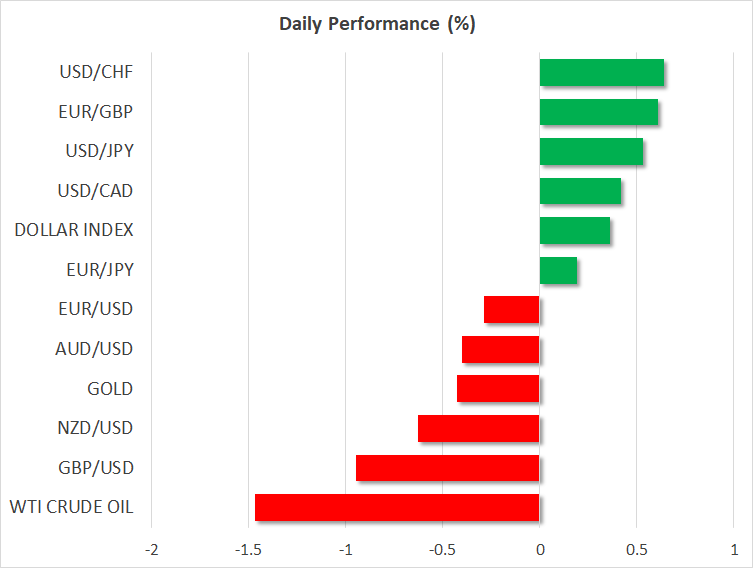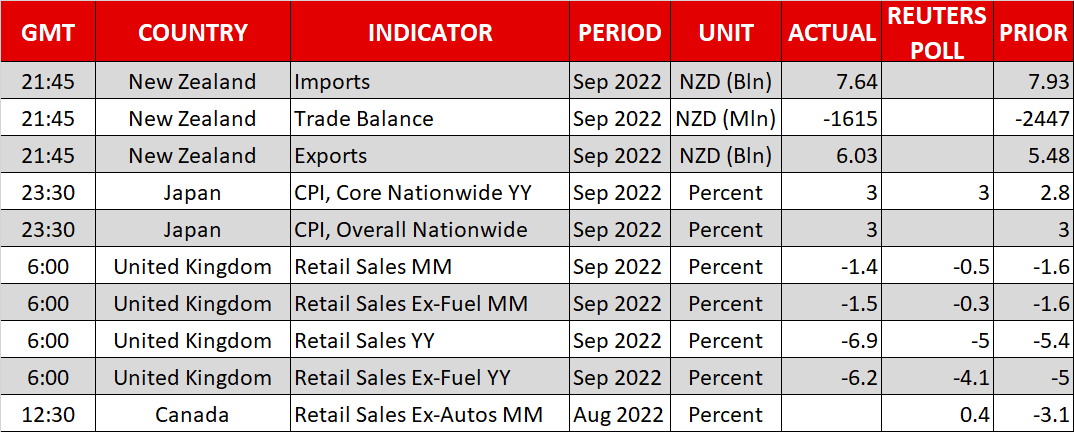Mood Sours As Yields Creep Up Again, UK PM Resigns
2022.10.21 08:15
[ad_1]
- Mixed earnings can’t save Wall Street as hawkish Fed talk pushes up yields
- UK yields are an exception, retreating after Truss quits as PM; pound briefly spikes
- Dollar crosses 150 yen threshold as BoJ too busy snapping up bonds

Markets contemplate 5% Fed funds rate
Wall Street’s latest attempt at a rebound has run into another wall as a mixed set of corporate earnings have left stocks vulnerable to renewed bets of aggressive tightening by the Federal Reserve. Philadelphia Fed President Patrick Harker warned on Thursday that policymakers are going to “keep raising rates for a while”, in what was one of the last remarks from a Fed official before the blackout period begins at midnight today ahead of the November 1-2 meeting.
Harker also implicitly said the Fed is “actively trying to slow the economy”, which when backed up by another lowly weekly jobless claims figure, investors responded by ramping up expectations of how high the Fed funds rate will go.
The terminal rate is now seen at 5%, meaning there’s some way to go still from the current range of 3%-3.25%. Treasury yields have been edging higher for much of October and the 10-year yield just hit 4.25% for the first time since 2008.
Hotter-than-expected CPI readings out of New Zealand, Canada and the United Kingdom this week have reinforced the view that the fight against inflation will take a lot longer than anyone anticipated.
Equities struggle amid earnings misses and Fed tightening
It’s no wonder therefore that stocks are back in the doldrums, having started the week in a much chirpier mood. Reports that the Biden administration is considering additional export controls to China on sensitive technology are also weighing on the market. Meanwhile, impressive earnings from Netflix (NASDAQ:) and IBM (NYSE:) have been unable to lift the broader market, with Tesla (NASDAQ:) shares plummeting on demand worries despite an earnings beat.
Snapchat parent Snap Inc (NYSE:). looks set to be today’s plunger after it reported disappointing Q3 revenue after yesterday’s market close, while Verizon Communications (NYSE:) and American Express (NYSE:) will be some of today’s earnings highlights.
The S&P 500 ended Thursday down 0.8% and futures point to further modest losses for Friday. If Wall Street avoids a big selloff today, the S&P 500 can still end the week with decent gains, though next week could be even more volatile when all the big tech names are scheduled to report.
In Europe, the major indices were sharply in the red, with the recent pullback in energy and gas prices doing little to lift some of the gloom around the outlook. Adidas (OTC:) was a drag after it cut its guidance, while the boost from Liz Truss resigning as UK prime minister was short-lived.
Pound hit by UK political chaos
The pound slipped back below $1.12 on Friday, more than erasing the immediate spike that came on the news that Truss had decided to quit, in what has been the shortest and most turbulent premiership in British history.
However, it didn’t take long for investors to realize that Truss’s demise will not end the political uncertainty. Even though the Conservatives have announced an expedited leadership contest, which will produce a new party leader within a week, there’s no guarantee that the next prime minister will be able to hold either the party nor the country together.
Retail sales data out today showing a big drop in sales in September is another red flag for the UK economy and the picture isn’t much better across the channel, with the euro also close to wiping out this week’s gains.
No sign of BoJ as dollar approaches 151 yen
The US dollar, on the other hand is on course to be the week’s biggest winner as it continues to trample over the yen, which has slipped past the 150-level that’s seen by many as a no-go area for the Japanese government.
However, rather than intervening in the currency market, the Bank of Japan has been active in the bond market, ramping up purchases of JGBs as the 10-year yield refuses to come below the Bank’s upper limit of 0.25%.
Bond yields are up across the board this week and only UK gilts have been able to buck the trend, thanks mainly due to the relief over the budget. The Bank of Japan is basically trying to do the impossible by going against market forces in both the FX and bond markets, although the absence this week of any yen intervention does raise some question marks about its commitment.

[ad_2]
Source link







